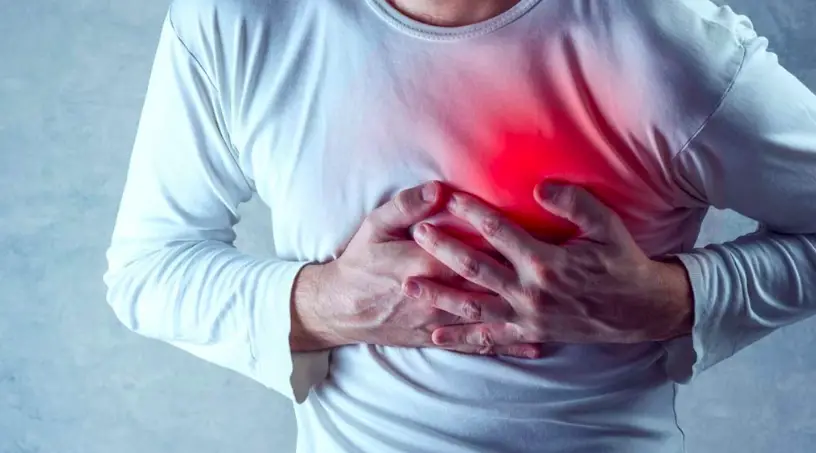La intercostal pain, although often considered harmless, can be a symptom of serious medical conditions, such as heart or lung pathologies, or even cancer.
This is why it is important to consult a health professional if you experience this type of pain.
In this article written by a health professional, we will rigorously analyze the origins and symptoms of intercostal pain, while closely examining its possible association with cancer.
The 5 important points to remember
- Intercostal pain, although most often benign, can signal serious conditions like cancer.
- Located between the ribs, it often results fromirritation of the intercostal muscles, varying from dull to sharp.
- The pain can make daily activities difficult, getting worse with coughing, sneezing, or deep breathing.
- Causes of intercostal pain include a variety of conditions, from pulmonary embolism to musculoskeletal problems.
- In case of persistent pain, it is crucial to consult a health professional for an accurate diagnosis and appropriate management.
Understanding Intercostal Pain: Definition and Symptoms
La intercostal pain, which you could potentially feel directly or observe in someone around you, manifests between the ribs.
The intercostal muscles, located between them and essential for maintaining the chest wall, can become irritated or inflamed, causing variable pain.
It can be felt as a dull feeling et painful or like a sharp pain et nagging, sometimes radiating towards other areas of the body such as the shoulder, neck or back.
Intercostal pain tends to get worse when cough, sneezing or an deep breathing, thus affecting everyday life in unexpected ways.
Intercostal Structure
The intercostal muscles are divided into three groups:
- the external intercostals (the largest and most superficial of the three groups)
- the internal intercostals
- the most internal intercostals.
They originate at the back of the sternum and attach to the ribs. The internal intercostals are located below the external intercostals and run in the opposite direction.
Together, these muscle groups play a vital role in raising the rib cage during inhalation and lowering it during exhalation.
Symptoms of intercostal pain
If you've ever felt intercostal pain, you know how often it can be triggered by daily gestures such as coughing, sneezing, or even a simple burst of laughter.
This pain, which manifests itself in different ways, can be accompanied by very specific symptoms.
It is common to feel a marked tenderness in the affected area, associated with sharp pains, almost like stabs.
Moments when breathing becomes difficult often accentuate this sensation, especially during a deep inspiration or a simple cough.
What makes intercostal pain even more intriguing is its propensity to spread towards the back or abdomen, adding a complex dimension to the way we perceive it.
Origins of intercostal pain
The origins of intercostal pain are multiple, each giving rise to a distinctive experience. Understanding these various causes can help decipher the specific nature of the pain you may be experiencing.
Some experience sharp, stabbing pain, indicative of certain origins, while others feel more of a dull sensation, signaling other underlying factors.
It is crucial to note that intercostal pain is not static ; it evolves according to body movements and deep breathing.
You may find yourself experiencing challenges in your daily activities, as intercostal pain can make certain tasks more difficult.
Potential Causes of Intercostal Pain
- Pulmonary embolism: a pulmonary embolism is a blood clot which lodges in the lungs and can cause severe chest pain.
- pneumonia: it's a lung infection which can cause chest pain and difficulty breathing.
- Bronchitis : bronchitis is a bronchial inflammation which can produce a wide range of symptoms, including chest pain, cough and shortness of breath.
- Musculoskeletal problems: problems such as costochondritis (inflammation of the cartilage between the ribs) or trauma to the ribs can cause intercostal pain.
Additional Causes of Chest Pain
- The aftermath of rib fracture : Rib fractures can often heal without complications, but in some cases they can cause chronic pain.
- Root compression by a Hodgkin's ganglion : a rare but serious condition that can cause severe pain.
- Vertebral compaction (decalcification): this is a condition that occurs when the vertebrae full spine lose calcium, which leads to their sagging and compression of the spinal cord. This can lead to pain, numbness, and weakness in the affected area.
- La spondylodiscitis and Pott's disease : The spondylodiscitis is an infection of the spine, and the Pott's disease is a form of tuberculosis that affects the spine.
- Neuroma and spinal cancer : Neuromas are tumors that grow on nerves, and spinal cancer is a very aggressive form of cancer.
- myeloma : Myeloma is a type of cancer that affects the bones, and a vertebral compaction can occur when the bones of the spine collapse.
Bonus!
Le traitement may include rest, application of ice or heat, pain relievers and anti-inflammatories, and stress relief techniques such as deep breathing or meditation.
Intercostal pain and cancer: what is the link?
By exploring the subtleties of intercostal pain, it is crucial to carefully examine the complex relationship with cancer. Although rare, this link deserves special attention.
Cancer may be underestimated as a potential source of intercostal neuralgia, a condition characterized by pain in the ribs and surrounding areas.
Various types of cancer, such as breast, lung, thestomach, theovary and pancreas, have the ability to invade or compress nerves in the chest, causing pain and other symptoms.
They can also induce intercostal neuralgia by causing inflammation or compression of the intercostal nerves, which connect the ribs and chest muscles.
Info point!
- An experienced management survey of 2018 by So Young Yoon and Jeeyoung Oh highlights the role of cancers in nerve compression, causing various types of neuropathic pain, including intercostal neuralgia.
- The prevalence of neuropathic pain caused by cancer remains high, reaching up to 40% in cancer patients.
– This prevalence mainly results from the cancer itselfrepresenting 64% of cases, and treatments such as chemotherapy and radiotherapy, which contribute to 20% of cases.
When to worry
La chest pain can be caused by many different conditions, ranging from mild to potentially serious.
Intercostal pain, or pain between the ribs, is often caused by muscle tension or inflammation of the nerves and muscles in this area.
However, noting that intercostal pain can also be associated with more serious conditions, such as lung cancer.
Cancerous tumors have the ability to grow in different parts of the body, sometimes compressing or invading nearby structures, including the ribs.
In the presence of lung tumors, it is common to feel pain when they exert pressure on the ribs.
The pain may become worse with deep breathing, coughing, or changing position.
It is essential to remain vigilant for these symptoms and consult a healthcare professional for a thorough evaluation..
Opinion of the healthcare professional
In consideration of intercostal pain and its possible link to cancer, it is crucial to emphasize that each medical situation is unique.
Intercostal pain can arise from a variety of causes, and although cancer may be one of them, it is imperative not to jump to conclusions about this possibility.
Intercostal neuralgia, characterized by pain in the ribs and nearby areas, can result from a variety of factors, some of which may be more common than others.
Important!
It is crucial to note that intercostal pain is not automatically linked to cancer.
Other factors, such as trauma, infections, the lung diseases and musculoskeletal problems, can also be the cause of intercostal pain.
Cancers of the breast, lung, stomach, ovary and pancreas are known for their potential to influence the nerves in the chest, potentially causing intercostal pain. However, this should not automatically give rise to excessive concern.
It is essential that anyone experiencing persistent chest or back pain consult a healthcare professional..
A thorough assessment, appropriate clinical examinations and careful consideration of symptoms are necessary to make an accurate diagnosis.
La close collaboration with your healthcare professional will allow you to better understand your specific situation, discuss possible risks and implement an appropriate management plan.
Medical data and knowledge are constantly evolving, and your healthcare professional is the best resource to guide you on your care journey.
References
Articles and resources used in the development of this article
Neuropathic cancer pain: prevalence, pathophysiology, and management – PMC (nih.gov)
Intercostal Neuralgia: Triggers, Symptoms, and Treatment (verywellhealth.com)
Cancer intercostal pain: causes, symptoms and treatments (umvie.com)








